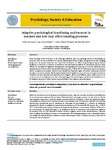Adaptive psychological functioning and burnout in teachers: implications on instructional processes

View/
Use this link to cite
http://hdl.handle.net/2183/35635
Except where otherwise noted, this item's license is described as Atribución-NoComercial-SinDerivadas 3.0 España
Collections
- Investigación (FEDU) [938]
Metadata
Show full item recordTitle
Adaptive psychological functioning and burnout in teachers: implications on instructional processesAlternative Title(s)
Funcionamiento psicológico adaptativo y burnout en docentes: implicaciones sobre los procesos instruccionalesDate
2023-03-31Citation
Romero, V., Núñez, J. C. ., Freire, C., & Ferradás, M. del M. (2023). Adaptive psychological functioning and burnout in teachers: Implications on instructional processes. Psychology, Society & Education, 15(1), 1–10. https://doi.org/10.21071/pse.v15i1.15345
Abstract
[Abstract] Given the high levels of burnout in the teaching profession, there is a growing interest in identifying the personal resources that would favor the positive psychological functioning in this group. From this emerging perspective, the present study had two objectives: (1) analyze the effect of psychological capital and job satisfaction on burnout in teachers; (2) determine how this syndrome affects the instructional practice (selfefficacy for teaching self-regulation strategies and teaching approach adopted). A structural equations model analysis was carried out with 113 teachers (90.3% women; Mage = 38.13; SD = 11.01) from pre-school, elementary school, compulsory secondary education and Bachillerato [optional higher secondary education]), selected through a convenience sample. Psychological capital and job satisfaction were shown to be negative predictors of burnout. In turn, this syndrome showed a direct negative effect on self-efficacy, and an indirect one on the student-centered teaching approach. These findings suggest that psychological capital and job satisfaction can be valuable resources to reduce teacher burnout and favor their adaptive job performance. [Resumen] Dados los elevados niveles de burnout en la profesión docente, existe un creciente interés por la identificación de los recursos personales que favorecerían el funcionamiento psicológico positivo en este colectivo. Desde esta incipiente perspectiva, el presente estudio tenía dos objetivos: (1) analizar el efecto del capital psicológico y la satisfacción laboral sobre el burnout docente; (2) determinar cómo este síndrome repercute en la práctica instruccional (autoeficacia para la enseñanza de estrategias de autorregulación y enfoque de enseñanza adoptado). Se efectuó un análisis de ecuaciones estructurales con 113 docentes (90.3% mujeres; Medad = 38.13; DT = 11.01) de Educación Infantil, Primaria, Secundaria y Bachillerato, seleccionados mediante un muestreo por conveniencia. El capital psicológico y la satisfacción laboral se mostraron como predictores negativos del burnout. A su vez, este síndrome evidenció un efecto negativo directo sobre la autoeficacia, e indirecto sobre el enfoque de enseñanza centrado en el estudiantado. Estos hallazgos sugieren que el capital psicológico y la satisfacción laboral pueden constituir recursos valiosos para reducir el burnout docente y favorecer su
desempeño laboral adaptativo.
Keywords
Self-efficacy
Burnout
Psychological capital
Teaching approach
Job satisfaction
Autoeficacia
Capital psicológico
Enfoque de enseñanza
Satisfacción laboral
Burnout
Psychological capital
Teaching approach
Job satisfaction
Autoeficacia
Capital psicológico
Enfoque de enseñanza
Satisfacción laboral
Editor version
Rights
Atribución-NoComercial-SinDerivadas 3.0 España
ISSN
1989-709X






